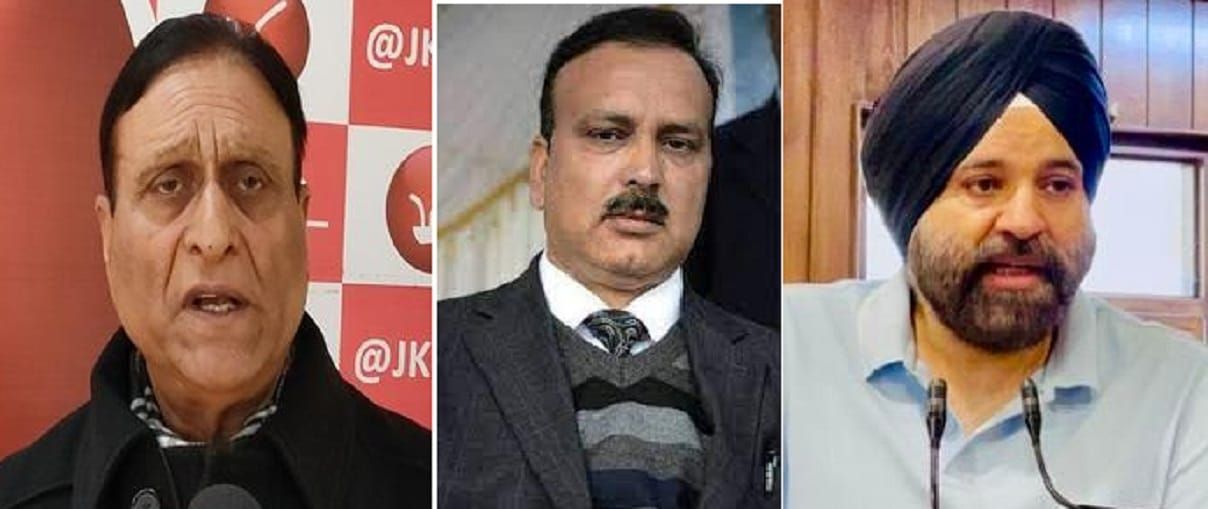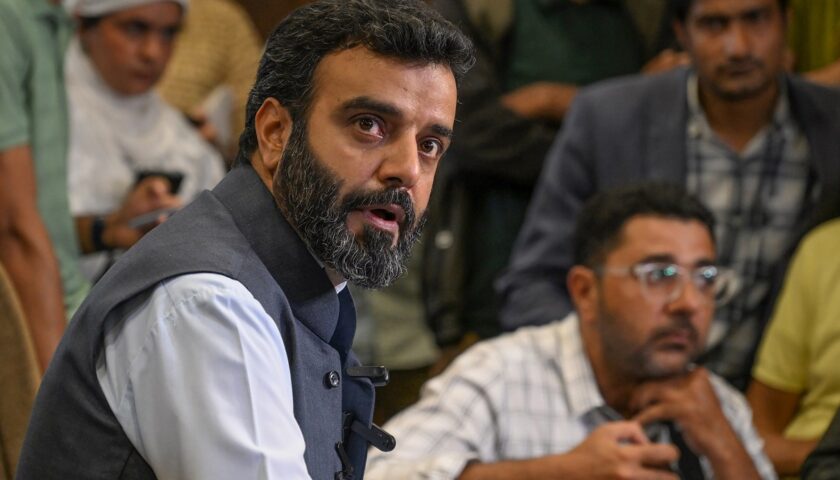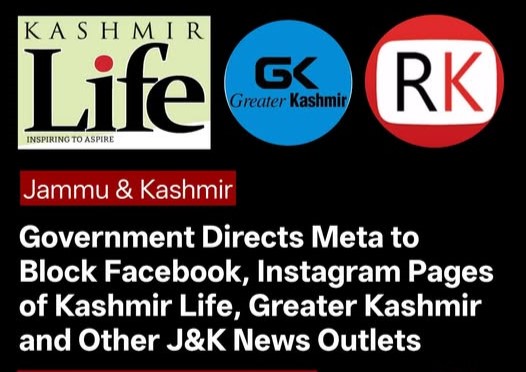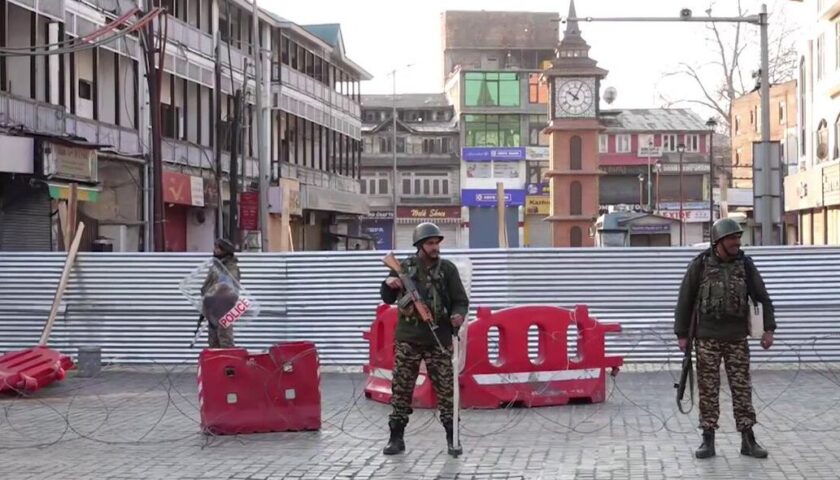NC Finalizes Rajya Sabha Picks Amid Political Crossroads
By: Javid Amin | 10 October 2025
After weeks of intense deliberation and speculation, the Jammu and Kashmir National Conference (NC) has formally announced its three candidates for the upcoming Rajya Sabha elections scheduled for October 24, 2025.
The nominees — Choudhary Muhammad Ramzan, Sajad Ahmad Kichloo, and Shammi Oberoi — represent a blend of political experience, regional representation, and party loyalty.
The announcement was made by NC General Secretary Ali Muhammad Sagar during a press briefing at the party’s headquarters in Srinagar. Flanked by senior leaders, Sagar underscored that the selections were finalized after comprehensive internal consultations headed by Farooq Abdullah and Chief Minister Omar Abdullah.
“The party has chosen leaders who have not only served the people but have also stood by the organization in challenging times,” said Sagar.
The declaration signals the NC’s renewed confidence in its internal leadership structure and its intent to maintain political stability within the INDIA bloc alliance.
Strategic Significance: Why These Elections Matter
The 2025 Rajya Sabha elections hold more weight for Jammu and Kashmir than usual.
Following the reconstitution of the J&K Legislative Assembly after years of central rule, this marks the first major parliamentary test for regional parties since the abrogation of Article 370 in 2019 and the restoration of limited legislative powers.
For the National Conference, the elections are not just about representation in Parliament but about reasserting its role as the dominant political force within the INDIA bloc alliance in the Union Territory.
The three Rajya Sabha seats assigned to J&K are crucial — both symbolically and strategically. Each seat translates to greater influence in national debates concerning statehood, governance, and development funding.
By naming trusted and experienced leaders, the NC aims to reinforce internal cohesion and project an image of stability amid shifting political alliances.
Candidate Profile: Choudhary Muhammad Ramzan — The Veteran Voice
Choudhary Muhammad Ramzan, a seasoned politician from North Kashmir, brings decades of political experience and administrative insight to the table. Known for his long-standing association with the National Conference, Ramzan has served multiple ministerial terms in previous governments and remains a respected figure among both party cadres and rural voters.
Ramzan’s selection is widely seen as a gesture of respect toward senior leadership and recognition of his consistent commitment to the NC’s core values — autonomy, inclusive governance, and regional balance.
“Ramzan Sahib is the conscience of our political movement,” a senior NC member remarked. “His presence in the Rajya Sabha will amplify the voice of Jammu and Kashmir’s people in Delhi.”
Beyond politics, Ramzan is known for his deep understanding of rural development, education, and social welfare policies, areas where he is expected to contribute significantly in parliamentary discussions.
Candidate Profile: Sajad Ahmad Kichloo — The Administrator Turned Politician
Representing the Jammu division, Sajad Ahmad Kichloo is known for his pragmatic leadership and administrative background.
A former minister with a strong base in the Chenab Valley, Kichloo’s inclusion ensures regional representation and balance within the NC’s Rajya Sabha lineup.
Kichloo’s tenure as a state minister was marked by his focus on infrastructure development, youth empowerment, and inter-community harmony — areas he intends to highlight at the national level.
His selection also carries political symbolism: a bridge between Jammu’s aspirations and Kashmir’s governance challenges, emphasizing NC’s effort to rebuild cross-regional trust.
“I see my nomination not as a personal achievement, but as a responsibility to represent every citizen of J&K with integrity,” Kichloo said in an informal conversation with reporters after the announcement.
Candidate Profile: Shammi Oberoi — The Strategist and Loyalist
Among the three, Shammi Oberoi represents the organizational backbone of the National Conference. Serving as the party’s treasurer and close aide to Omar Abdullah, Oberoi’s elevation to the Rajya Sabha nomination is both a reward for loyalty and recognition of her behind-the-scenes contributions.
Oberoi, known for her efficiency and low-profile work ethic, has been instrumental in managing party finances, coordinating campaigns, and strengthening NC’s grassroots communication network.
Her nomination signals Omar Abdullah’s growing focus on organizational transparency and modern political management within the party.
Political analysts view Oberoi’s entry into the Rajya Sabha as a move toward inclusivity and gender representation, reinforcing NC’s progressive image in an evolving political landscape.
Alliance Calculus: Ongoing Seat-Sharing Talks with Congress
While the National Conference has announced its three nominees, the fourth seat remains under discussion with the Congress, its alliance partner within the INDIA bloc.
The two parties collectively command 24 votes in the 90-member Jammu and Kashmir Assembly, while the BJP holds 28, making the fourth Rajya Sabha seat a potential toss-up.
According to NC insiders, intense backchannel negotiations are underway to finalize whether Congress will contest for one of the safer seats or the more competitive fourth slot.
A senior Congress leader hinted that the party expects “mutual respect in seat-sharing arrangements,” emphasizing unity over competition within the INDIA bloc.
Political observers believe the outcome of these discussions could reshape alliance dynamics across northern India, as both parties aim to project a united front before the 2026 Lok Sabha elections.
Vote Arithmetic and Legislative Context
The Rajya Sabha elections in J&K will be conducted by the newly constituted legislative assembly, where the NC holds 21 seats, Congress 6, and the PDP, DPAP, and independents make up smaller shares.
Given this configuration:
-
NC can comfortably secure two seats on its own.
-
The third seat can be won with Congress’s support.
-
The fourth seat, however, depends on cross-voting or alliance cohesion within the INDIA bloc.
The BJP, with 28 MLAs, remains a formidable opponent, capable of winning at least one seat outright and influencing the fourth.
Thus, these elections will serve as a test of discipline within the INDIA bloc and a barometer of political unity against BJP’s dominance.
The Larger Political Message
By fielding seasoned leaders and loyal functionaries, the NC aims to send a clear message — that experience, stability, and trust remain its core strengths.
Political experts argue that the selection reflects Omar Abdullah’s dual strategy:
-
Strengthening internal ranks with loyalists like Shammi Oberoi, and
-
Projecting administrative credibility through veterans like Ramzan and Kichloo.
Dr. Feroz Ahmad, a political commentator based in Srinagar, noted:
“The NC is recalibrating its image. It wants to be seen as a party of governance, not just grievance. These Rajya Sabha picks reinforce that narrative.”
The move also underscores NC’s intent to play a constructive role in the national policy discourse — especially on issues like federalism, regional development, and political restoration of Jammu and Kashmir’s statehood.
Alliance Math: INDIA Bloc vs BJP
The Rajya Sabha elections will also serve as a mini referendum on the INDIA bloc’s strength in the Union Territory.
While NC and Congress have maintained cordial ties, their negotiating positions differ:
-
NC seeks to assert regional primacy.
-
Congress aims for visibility in a politically charged environment.
Meanwhile, the BJP has been aggressively reorganizing its base in Jammu and parts of South Kashmir, seeking to retain its narrative dominance.
If the NC-Congress combine successfully navigates seat-sharing, it could set a template for collaboration across other northern states before the general elections.
Balancing Experience, Region & Gender
The NC’s choice of candidates strikes a careful balance:
-
Experience (Ramzan) ensures credibility in Parliament.
-
Regional diversity (Kichloo) strengthens outreach beyond the Valley.
-
Gender representation (Oberoi) signals inclusivity.
This triad mirrors the NC’s evolving image — from a regional party rooted in legacy to a modern political force capable of national-level articulation.
Inside NC’s Selection Process
According to party insiders, the final shortlist was the outcome of weeks of internal consultations, chaired jointly by Farooq and Omar Abdullah.
District presidents, core committee members, and senior legislators were consulted to ensure consensus-based selection.
“Each name reflects both competence and loyalty,” said a senior functionary familiar with the discussions.
Omar Abdullah reportedly pushed for a blend of generational continuity and renewal, while Farooq Abdullah emphasized the importance of institutional experience in Parliament.
This coordination between father and son leadership further solidifies NC’s command hierarchy, which has remained largely stable despite shifting political tides.
What Lies Ahead
With nominations finalized, the focus now shifts to campaign coordination and alliance negotiation.
Both NC and Congress will need to maintain discipline among MLAs to avoid cross-voting — a concern often seen in tightly contested Rajya Sabha polls.
Meanwhile, the BJP is expected to field strong candidates and leverage its organizational machinery to consolidate votes from smaller parties and independents.
Observers predict an intense but civil campaign, with each party positioning its candidates as the true voice of Jammu and Kashmir in Parliament.
Bottom-Line: Beyond Numbers, A Battle for Narrative
The National Conference’s Rajya Sabha nominations are more than a procedural announcement — they mark a defining moment in J&K’s post-reorganization political narrative.
By putting forth Ramzan, Kichloo, and Oberoi, the party has:
-
Reinforced its internal stability,
-
Balanced regional and gender representation, and
-
Reasserted itself as a credible parliamentary force.
The upcoming elections will test not only numbers but trust, discipline, and coalition management across party lines.
Whether NC and Congress can align their interests to counter the BJP’s well-oiled electoral machine remains the central question — one that could shape not just Rajya Sabha arithmetic, but the future of Jammu and Kashmir’s political direction.




